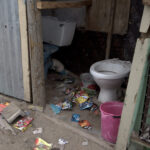Despite fear-mongering by some and threats that their arrival will be met with protests, the cluster is unlikely to introduce new coronavirus cases to the country. Why? The group has been under quarantine for weeks and screened multiple times a day.
South Africa has welcomed home 114 citizens from the epicentre of China’s coronavirus outbreak, Wuhan. But as cases of the new virus continue to mount here at home, the arriving group is unlikely to add to these numbers.
Each member of the group that arrived this morning had already tested negative for the new coronavirus before boarding the flight from Wuhan, according to Health Minister Zweli Mkhize. Anyone who would have tested positive for the virus before hopping on the chartered plane would have been referred to the Chinese health system, Mkhize says.
Originally, 121 South Africans confirmed that they wanted to be repatriated. Seven decided to stay behind in the end, but none of them tested positive, according to health department spokesperson, Popo Maja.
As of 13 March, Mkhize had confirmed 24 cases of the disease the World Health Organisation had dubbed COVID-19 in South Africa. More cases were expected to be announced as national laboratories continued to process tests.
The illness, which is marked by flu-like symptoms and difficulty breathing, is caused by a new virus named Sars Coronavirus 2 (SARS-CoV-2) — “Sars” because of its similarity to the virus responsible for the 2003 outbreak of severe acute respiratory syndrome in China.
All South African cases are among people who have recently returned from countries such as Italy, Germany, Austria, the United Kingdom and the United States, the health department said on Thursday. Those in need of treatment have been hospitalised, while others have been asked to self-quarantine at home. Government tracing teams are locating people who may have been in contact with anyone infected.
As of late Saturday afternoon, there were still no confirmed cases of transmission of the virus on South African soil.
Wishing our Wuhan repatriation Dept. of Health medical team member, Ahmed Bham a happy birthday. We salute you as you spend your special day in the line of duty pic.twitter.com/JcvJ0VF7LG
— Dr Zweli Mkhize (@DrZweliMkhize) March 12, 2020
Many South Africans have taken to social media to wonder whether today’s homecoming would bring with it another case of the virus. But those returning to the country have already been under quarantine in Wuhan since late January, and South Africa’s quarantine process will err on the side of caution — further diminishing the risk of a new case among the group.
[WATCH] Protect yourself from the new coronavirus in six simple steps
Wuhan contingent has been heavily monitored for the virus since January
People who returned from Wuhan today have been repeatedly tested for SARS-CoV-2, says Shaheen Mehtar, head of the national health department’s coronavirus infection prevention and control programme.
One of the people who returned is student Khosi Motaung*. At least 20 students among the group were screened at each meal daily.
“You have to have your temperature taken before you’re allowed to get your food — it’s one of those thermometers they use at airports,” Motaung, who stayed at a student residence, told Bhekisisa in an interview last week. “If your temperature is too high, they scan you a few times to make sure you have a fever before they take you to the hospital.”
South Africa’s quarantine — the earlier the better, shows international experience
Motaung and the other 121 people who returned today will now face another 21 days in quarantine, a longer period than the World Health Organisation’s recommended 14 days for people who have been in contact with the virus.
Quarantines involve keeping people who are not ill but have been exposed to an infectious disease, separate from the rest of the population to help stem its spread. People who then develop the condition are then put into isolation.
The national health department has confirmed that the quarantine venue is the Ranch Resort near Polokwane.
According to the National Institute for Communicable Diseases’ Cheryl Cohen, the decision to quarantine the Wuhan contingent as a group made logistical sense given that so many people were returning together from a high-risk area.
No quarantine is yet recommended for people without symptoms who have returned from a country reporting cases of the virus.
Historically, officials have weighed the need to contain outbreaks via these measures against the cost of infringing on people’s human right to move freely. But quarantines work best when only a few cases of sickness have been reported, Cohen explains. If an illness is already widespread, the tactic is of little use.
China started too late — the longer you wait, the harder it is to stop the spread
A modelling study published in The Lancet journal in February predicted that the new coronavirus wasn’t contained early enough in China to prevent its spread globally.
This week, the World Health Organisation officially declared the outbreak a pandemic. The international health body had previously called the new coronavirus outbreak a “public health emergency of international concern”.
However, the global health body has admitted that calling the outbreak a “pandemic” does little to change the world’s response to it.
Meanwhile, China’s drastic decision to completely close off areas profoundly affected by the virus helped slow its spread.
[WATCH] South African Health Minister Zweli Mkhize brief media on quarantine procedures for South Africans returning from Wuhan
But not all countries have the capacity or the authoritarian social control to pull off what China did.
Today, Italy — which has seen the second-highest number of deaths after China — is trying a similarly ambitious approach. What began with a quarantine of 10 cities, has now become a nationwide shutdown. The Mediterranean country has banned public gatherings.
Quarantines in Japan, which attempted to among other things lockdown a cruise ship, and South Korea — where the city of Daegu was asked to self-quarantine — have also been less effective.
Japan and South Korea were unable to enforce strict control measures or did not have adequate procedures in place to detect cases early enough before they began spreading.
A recent study in the journal Infectious Disease Modelling found that the rate at which the new virus spread on the cruise liner was up to almost 11 times faster than that documented in places like China and Singapore. Similar research currently in print from South Korea found that 80% of the country’s cases between late-January to February came from just two clusters of infections — a church and a hospital.
“Mandatory, involuntary quarantines can be difficult to enforce, and counterproductive,” Jeremy Konyndyk, a senior policy fellow at the Center for Global Development and former head of Global Disaster Response at the United States Agency for International Development told the magazine, Wired. “What you really want is for people to buy into it and feel they’re supported.”
The more people understand why quarantines are needed, the more likely that they will comply and the easier it is to contain transmission of the virus.
With just a dozen or so cases so far in South Africa, quarantining patients here now will be much easier.
For Motaung, arriving back to South Africa is something that at one point, he never thought he’d do.
“At first, I refused to come back, but my parents have begged me to come home so many times, I changed my decision,” he says.
“I still have to write my dissertation and defend it — then, finally, I can graduate,” explains Motaung. “When that will happen, I don’t know.”
*Not their real names
[14 March 11:35am This story was updated to reflect the actual number of South Africans who arrived in the country from Wuhan — the number announced by the health department before their departure was 121, but only 114 chose to be repatriated in the end.]








